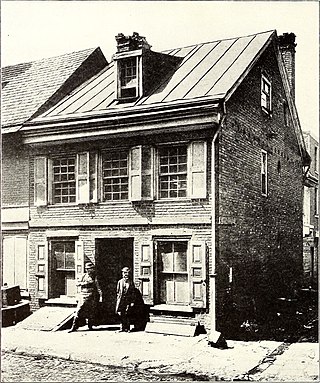Related Research Articles

Springettsbury Township is a township in York County, Pennsylvania, United States. The population was 27,058 at the 2010 census. The township takes its name from Springett Penn, grandson of Pennsylvania founder William Penn. Located east and northeast of the city of York, the township hosts the York Galleria shopping mall and a large Harley-Davidson manufacturing plant.
Penn may refer to:

Hannah Margaret Penn was an Anglo-American governor. The second wife of Pennsylvania founder William Penn, she effectively administered the Province of Pennsylvania for six years after her husband suffered a series of strokes, and then for another eight years after her husband's death. She served as acting proprietor from 1712 until her death in 1726.

The Province of Pennsylvania, also known as the Pennsylvania Colony, was a British North American colony founded by William Penn, who received the land through a grant from Charles II of England in 1681. The name Pennsylvania was derived from "Penn's Woods", referring to William's father Admiral Sir William Penn.

Andrew Hamilton was a Scottish lawyer in the Thirteen Colonies who settled in Philadelphia. He was best known for his legal victory on behalf of the printer and newspaper publisher John Peter Zenger. His involvement with the 1735 decision in New York helped to establish that truth is a defense to an accusation of libel. His eloquent defense concluded with saying that the press has "a liberty both of exposing and opposing tyrannical power by speaking and writing truth."
Samuel Chew was a physician who served as chief justice of colonial Delaware.

William Cooper was an American merchant, land speculator and developer, the founder of Cooperstown, New York. A politician, he was appointed as a county judge and later served two terms in the United States Congress, representing Otsego County and central New York. He was the father of James Fenimore Cooper, who became a noted writer of historical novels related to the New York frontier.

Edward Shippen was the second mayor of Philadelphia, although under William Penn's charter of 1701, he was considered the first.

Pennsbury Manor is the colonial estate of William Penn, founder and proprietor of the Colony of Pennsylvania, who lived there from 1699 to 1701. He left it and returned to England in 1701, where he died penniless in 1718. Following his departure and financial woes, the estate fell into numerous hands and disrepair. Since 1939 it has been the name of a reconstructed manor on the original property.

David Lloyd was an American lawyer and politician from Chester, Pennsylvania. He was the first Attorney General of the Province of Pennsylvania and a member of the popular party. He served 9 terms in the Pennsylvania General Assembly, including 9 terms as its Speaker, and 14 years as Chief Justice of the Pennsylvania Supreme Court.
Charles Augustus Barnitz was an American politician who served as an Anti-Masonic member of the U.S. House of Representatives for Pennsylvania's 11th congressional district from 1833 to 1835.

Thomas Lloyd was a lieutenant-governor of the Province of Pennsylvania and a Quaker preacher.
William Penn Jr. was the eldest surviving son of William Penn, proprietor and founder of the colony of Pennsylvania.
Springett Penn may refer to:

John Grubb (1652–1708) was a two-term member of the Pennsylvania Provincial Assembly and was one of the original settlers in a portion of Brandywine Hundred that became Claymont, Delaware. He founded a large tannery that continued in operation for over 100 years at what became known as Grubb's Landing. He was also one of the 150 signers of the Concessions and Agreements for Province of West Jersey.
Richard Penn Jr. served as the lieutenant governor of the Province of Pennsylvania from 1771 to 1773, and was later a member of the British Parliament.

William Penn was an English writer, religious thinker, and influential Quaker who founded the Province of Pennsylvania during the British colonial era. Penn was an advocate of democracy and religious freedom known for his amicable relations and successful treaties with the Lenape Native Americans who had resided in present-day Pennsylvania prior to European settlements in the state.

Yorklyn is a census-designated place (CDP) in York County, Pennsylvania, United States. The population was 1,912 at the 2010 census. The area was delineated as the Springetts Manor-Yorklyn CDP for the 2000 census.

Letitia Street House is a modest eighteenth-century house in West Fairmount Park, Philadelphia. It was built along the Delaware riverfront about 1713, and relocated to its current site in 1883. The house was once celebrated as the city residence of Pennsylvania's founder, William Penn (1644–1718); however, later historical research determined that he never lived there.
Gulielma Maria Posthuma Penn was the first wife of William Penn, the notable Quaker writer, religious thinker and founder of Pennsylvania.
References
- This article incorporates text from a publication now in the public domain : Wilson, J. G.; Fiske, J., eds. (1900). . Appletons' Cyclopædia of American Biography . New York: D. Appleton.